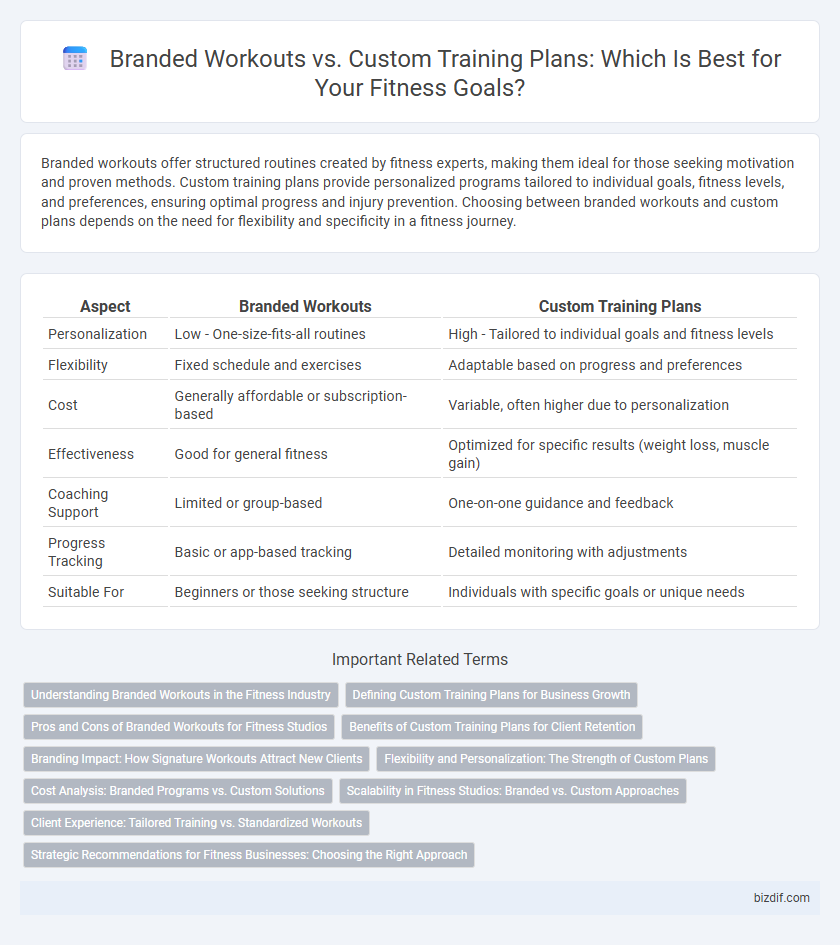Branded workouts offer structured routines created by fitness experts, making them ideal for those seeking motivation and proven methods. Custom training plans provide personalized programs tailored to individual goals, fitness levels, and preferences, ensuring optimal progress and injury prevention. Choosing between branded workouts and custom plans depends on the need for flexibility and specificity in a fitness journey.
Table of Comparison
| Aspect | Branded Workouts | Custom Training Plans |
|---|---|---|
| Personalization | Low - One-size-fits-all routines | High - Tailored to individual goals and fitness levels |
| Flexibility | Fixed schedule and exercises | Adaptable based on progress and preferences |
| Cost | Generally affordable or subscription-based | Variable, often higher due to personalization |
| Effectiveness | Good for general fitness | Optimized for specific results (weight loss, muscle gain) |
| Coaching Support | Limited or group-based | One-on-one guidance and feedback |
| Progress Tracking | Basic or app-based tracking | Detailed monitoring with adjustments |
| Suitable For | Beginners or those seeking structure | Individuals with specific goals or unique needs |
Understanding Branded Workouts in the Fitness Industry
Branded workouts, such as CrossFit, Orangetheory, and F45, offer structured fitness programs with standardized exercises designed for group settings and widespread appeal. These workouts often incorporate trademarked methodologies and specific equipment, ensuring consistency and community engagement across global locations. Understanding branded workouts highlights their role in promoting accessibility, motivation, and scalability in the fitness industry.
Defining Custom Training Plans for Business Growth
Custom training plans are personalized fitness programs tailored to an individual's specific goals, fitness levels, and preferences, enhancing client engagement and retention. Unlike branded workouts that offer generic routines, custom plans incorporate detailed assessments, progress tracking, and adaptive strategies to address unique needs. Businesses leveraging custom training plans experience higher customer satisfaction and increased revenue through targeted service differentiation and loyalty building.
Pros and Cons of Branded Workouts for Fitness Studios
Branded workouts offer fitness studios a proven framework that attracts clients familiar with the brand's reputation and style, streamlining marketing efforts and ensuring consistent class delivery. However, these programs can limit customization, potentially failing to address individual member needs or specific fitness goals, which may reduce long-term client retention. The reliance on external brand licensing fees and rigid class formats can also impact studio profitability and flexibility in adapting to emerging fitness trends.
Benefits of Custom Training Plans for Client Retention
Custom training plans deliver personalized workout routines tailored to individual goals, fitness levels, and preferences, fostering greater client satisfaction and long-term engagement. Unlike branded workouts, these plans adapt dynamically based on progress and feedback, enhancing motivation and reducing plateau risks. Personalized attention increases client loyalty, promoting consistent attendance and higher retention rates in fitness programs.
Branding Impact: How Signature Workouts Attract New Clients
Signature workouts with strong branding create a unique identity that instantly resonates with potential clients, making fitness programs more memorable and marketable. Branded workouts leverage recognizable names, colors, and themes, which enhance client trust and perception of professionalism, driving higher engagement rates. This branding impact frequently results in increased client acquisition compared to generic or custom training plans lacking a clear, consistent brand presence.
Flexibility and Personalization: The Strength of Custom Plans
Custom training plans offer unmatched flexibility and personalization by tailoring workouts to individual fitness levels, goals, and preferences, ensuring optimal progress and injury prevention. Unlike branded workouts with fixed routines, custom plans adapt dynamically to changing schedules, recovery needs, and performance feedback, maximizing efficiency and motivation. Personalized strength, endurance, and mobility exercises allow for a holistic approach, fostering consistency and long-term success in fitness training.
Cost Analysis: Branded Programs vs. Custom Solutions
Branded workouts often present a lower upfront cost, with fixed pricing models appealing to budget-conscious fitness enthusiasts, while custom training plans typically incur higher fees due to personalized assessment and tailored programming. The scalability of branded programs allows for mass distribution, reducing per-user cost, whereas custom solutions require significant coach involvement, increasing time and labor expenses. Evaluating long-term value, custom plans may deliver more precise results and reduced injury risks, potentially lowering indirect costs related to health setbacks compared to generic branded workouts.
Scalability in Fitness Studios: Branded vs. Custom Approaches
Scalability in fitness studios is significantly influenced by the choice between branded workouts and custom training plans. Branded workouts offer standardized, easily replicable formats that enable studios to quickly expand class offerings without extensive resource investment. Custom training plans, while tailored to individual client needs, require more dedicated staff time and expertise, making large-scale implementation more challenging but providing higher client retention through personalized experiences.
Client Experience: Tailored Training vs. Standardized Workouts
Customized training plans offer a superior client experience by addressing individual fitness goals, physical limitations, and preferences, ensuring effective and enjoyable workouts. Branded workouts provide a standardized routine beneficial for consistency but often lack personal adaptation, which can limit progress and client motivation. Personalized plans enhance engagement and results by adapting exercises, intensity, and frequency based on ongoing assessments and feedback.
Strategic Recommendations for Fitness Businesses: Choosing the Right Approach
Strategic recommendations for fitness businesses emphasize the importance of aligning branded workouts with their target audience's needs, leveraging the wide appeal and proven success of established programs to build brand credibility and streamline marketing efforts. Custom training plans deliver personalized solutions that address individual client goals, increasing client retention and satisfaction through tailored progress tracking and adaptability. Prioritizing a hybrid model that integrates branded workouts for scalability and custom plans for personalization can maximize business growth and client engagement.
Branded workouts vs Custom training plans Infographic

 bizdif.com
bizdif.com